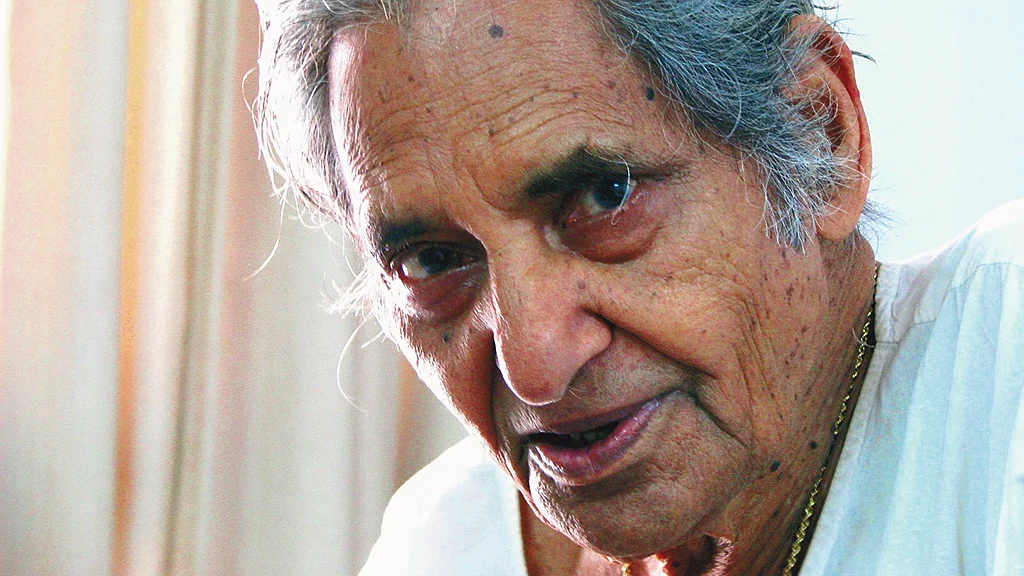Gopaldas Neeraj: ‘Karwan guzar gaya…!’
The master poet was finding it difficult to pay for his medicare ever since the Yogi Adityanath government stopped the UP government pension worth ₹50,000 a month

Neeraj Ji was a shayar of Hindi and a Kavi of Urdu,” tweeted noted poet and writer Javed Akhtar on learning that Gopaldas Saxena alias ‘Neeraj’ had passed away.
A reluctant lyricist, it took film director R. Chandra several years to persuade Neeraj to move to Bombay. When Chandra first proposed that he should move to Bombay and write lyrics for films, the offer was disdainfully turned down by Neeraj. The director, he had said, was free to choose any of his poems but he would not write on demand.
Six years later when Chandra made his film Nai Umar Ki Nai Fasal (1966), he picked the poem, Karwaan guzar gaya, gubaar dekhte rahe (The caravan did pass/As I strained to see through the dust) and arguably immortalised it. Even after half a century, the song remains as popular and has arguably become synonymous with Neeraj.
He did move to Bombay for some time and bonded with S.D. Burman and Jaikishen. But with the death of Burman in 1975 and Jaikishen earlier in 1971, the poet decided to move back to Aligarh. Raj Kapoor, for whose film Mera Naam Joker, he wrote the number, Aye bhai, zara dekh ke chalo…, is said to have told him in zest that once people get into Bollywood, they reach a point of no return.
But Neeraj, or so folklores have it, apparently retorted that people like Kapoor may find no life or meaning beyond Bollywood but for him it held no charm. And true enough, he returned to Aligarh and kept writing poems till the very end. He would often attend functions in Delhi and other cities and recite his poems.
At a time when Urdu was ruling the roost in the Hindi film industry, ‘purer’ Hindi songs of Neeraj came as a whiff of fresh air with unusual turn of words like “Badal, Bijli, Chandan, Paani” to describe ‘love’.
Many of his poems stand testimony to his unique imagery. Take these lines for example,
Jheelon ke honthon par, meghon ka raag hai
Phoolun ke seenay mein, thaandi thandi aag hai
(On the lips of the lakes is the melody of the clouds
A cool flame burns in the flowers’ heart…)
Having lost his father at the age of six, he was forced to start working for a living at a tender age. He taught Hindi in a college in Aligarh for many years
The last years of the poet were by all accounts painful. Barely seven days before his death, he had written a letter seeking permission to put an end to his life. Some of his admirers were poignantly reminded of his lines Girane se darta hai kyon, Marane se darta hai kyon? (Why are you scared of falling? Why are you scared of dying?)
He was finding it difficult to pay for his medicare ever since the Yogi Adityanath government stopped the UP government pension worth Rs 50,000 every month.
The UP Chief Minister apparently did not reply to his letters and though he did grant the 93-year-old poet an audience in Lucknow, the pension was restored in haste only after he passed away.
This is how Neeraj viewed poets and poetry: Aatma ke saundarya ka shabd-roop hai kaavya…/ maanav hona bhaagya hai, kavi hona saubhaagya
(Poetry is the expression in words of the beauty of the soul; Those born as human beings are lucky but those who develop into poets are luckier).
A humanist, a non-believer and a rationalist, he lived the syncretic Ganga-Jamni tehzeeb of India.
Ab toh mazhab koi aisa bhi chalaya jaaye,
Jismein insaan ko insaan banaya jaaye... !
(Let’s now have at least one such religion/Which can convert people into human beings)
Three years ago, the poet had willed that his body be donated to AMU’s Medical College.
He had hoped that his body would help medical students.
His poetry has always had a strange effect on me, like seeing a hungry mother breastfeeding her baby, or a tall tree in scorching heat providing shade to others, a lamp burning itself to give light and an aching heart wishing others well.
The heart ached as one absorbed the news of his death. And almost as reflex action, I began to hum two of my favourite lines from Neeraj:
Khilte hain gul yahaan,
khilkay bikharane ko !
(Here the flowers bloom but only to wither away)
Follow us on: Facebook, Twitter, Google News, Instagram
Join our official telegram channel (@nationalherald) and stay updated with the latest headlines
